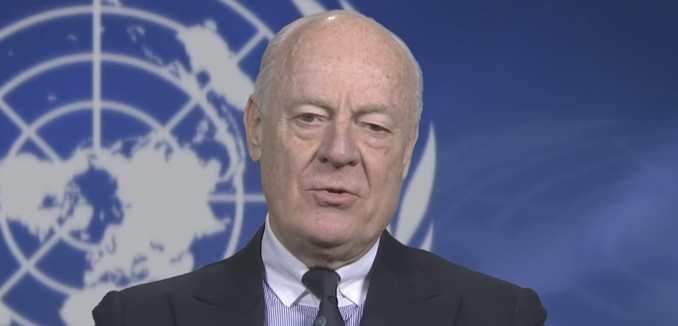International donors pledged over $10 billion to assist refugees fleeing from Syria’s civil war, the Associated Press reported on Thursday.
British Prime Minister David Cameron said at the aid conference in London that the money “will save lives, will give hope, will give people the chance of a future.”
Participants pledged nearly $6 billion for this year and $5 billion more by 2020. The amount is less than the $9 billion that the United Nations estimated was needed for 2016.
The pledges came a day after Staffan de Mistura, the UN’s special envoy to Syria, announced the early suspension of peace negotiations in Geneva. De Mistura insisted that the talks haven’t failed, and that they will resume on February 25.
Bashar Jaafari, who heads Syrian dictator Bashar al-Assad’s delegation to the negotiations, blamed rebel groups for their suspension, claiming that the governments of Saudi Arabia, Qatar, and Turkey ordered them “to bring about the talks’ failure.”
The chief coordinator of Syria’s opposition High Negotiations Committee (HNC), Riad Hijab, countered Jaafari’s charge, saying, “The whole world sees who is making the negotiations fail. Who is bombing civilians and starving people to death.”
United Nations Security Council Resolution 2254, which outlined the formal negotiation process, also demanded an end to the besiegement and bombing of civilian areas, though forces loyal to Assad and his allies have failed to comply.
The HNC complained last month that U.S. Secretary of State John Kerry was pressuring rebel groups to attend the peace talks or face a cut in funding.
Tony Badran, a research fellow at the Foundation for Defense of Democracies, reported on Twitter that Kerry had dismissed the need for Assad to abide by the Security Council resolution as “unacceptable ‘preconditions.’” Ambassador Robert Ford, the last U.S. ambassador to Syria, replied by writing, “If Kerry did say such, then no US Govt credibility after voting 4 UN Secuty Council resolutions 2118, 2139 and 2254.”
Maj. Hassan Ibrahim, a rebel commander who had defected from Assad’s army, told The New York Times on Thursday that his forces were facing hardships, including the depletion of weapons and funds from America and its allies, and the increased difficulty of crossing in and out of Jordan.
“They are doing it to put pressure on us to accept a political process,” Ibrahim told the Times, adding that he saw no indication that Assad or his backers would compromise at all.
According to the Times, there was a “growing foreboding among the opposition’s fighters and civilians, mirrored by growing hope on the government side, that Washington, interested only in bombing the Islamic State militant group, is ceding the field to Russia and leaving the opposition on its own.”
An editorial published Wednesday in The Washington Post criticized the Obama administration for failing to demand that Assad and his allies comply with resolution 2254, and accused it of “enabling…war crimes” by offering nothing more than rhetoric.
Also on Thursday, Iran’s Fars news agency reported that Iranian Brigadier General Mohsen Qajarian was killed in battle. The Islamic Republic’s forces have suffered heavy losses in Syria, prompting a reported withdrawal of most Iranian troops in December.
[Photo: UN Geneva / YouTube ]




